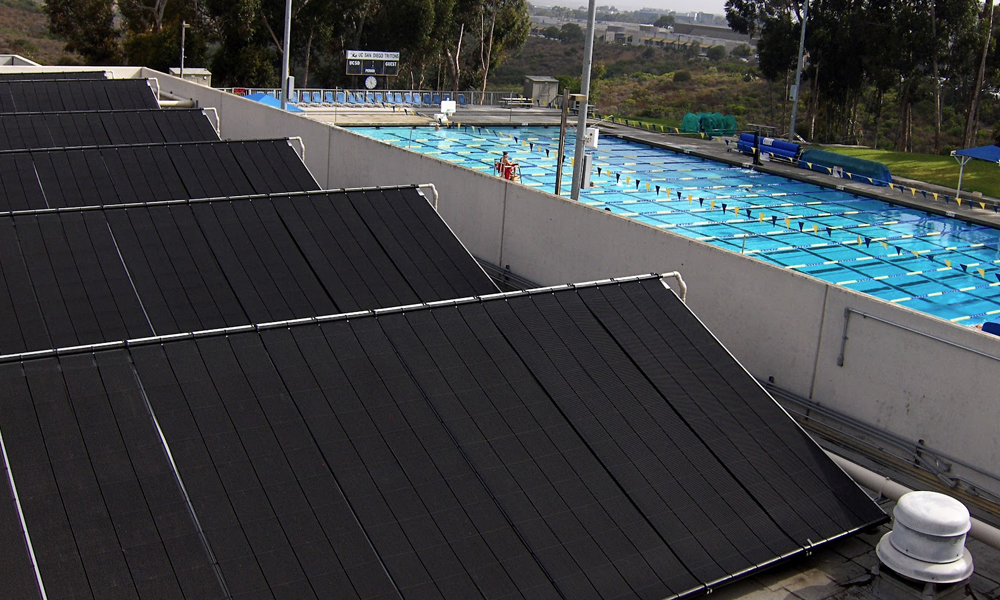Solar pool heating in Brisbane makes using your swimming pool a lot more of an enjoyable experience in the cooler months. What is not an enjoyable experience, is a swimming pool that burns your eyes or makes your skin itchy. No matter what kind of general or solar pool heating option you have at your Brisbane home, testing your swimming pool should be a part of your regular swimming pool maintenance. The longer your pool is heated, the more you will need to test your pool, and you should aim to test your pool at least 3 times a week. It doesn’t have to be a drag, here are some simple tips to make the process a lot easier for you.
Understand what you are testing for
You know there are a number of things you need to test for when it comes to your swimming pool and solar pool heating in Brisbane, and these include pH, Chlorine levels, Alkalinity, cyanuric acid, and water hardness. The ideal pH for a swimming pool should be between 7.4 and 7.6. Anything less will cause burning eyes, and below pH7 is quite acidic. The pH is pretty important as it will set the tone for your swimming pool water, and will ensure that your family will keep using it during the extended swimming season. Chlorine is also important because it kills nasties such as bacteria, algae, and micro-organisms. Alkalinity refers to the alkaline materials that are dissolved in your swimming pool, and how your pool resists pH changes does depends on the alkaline material that is present. cyanuric acid is a stabilising ingredient in chlorine that prevents it from being destroyed by the sun, however, too much affects the chlorine. Water hardness tests for the calcium and magnesium in your pool, which can lead to scale forming in your pipes, filters, and plumbing, and the ideal level should be 200-400 ppm.
How to test your swimming pool when you have solar pool heating in Brisbane
Testing your pool water is a simple process. Water drop sampling kits are very simple and so are strip tests. A professional test will also cover all the tests that you need for your swimming pool, so you should include this as a part of your regular testing. Take water samples from the deep end of your pool, at least 20-30cm below the surface. You can collect your water in a sample bottle, or a clean, plastic container, and when you are finished your tests, make sure that you never dump the test solution back into the swimming pool. Some pool shops will also test your pool or spa water for free, all you need to do is bring in a sample of your pool water. By keeping ahead of your swimming pool testing you save yourself from needing to purchase additional chemicals.
Tips for treatments
Regarding swimming pools with solar pool heating in Brisbane, if you choose to avoid using cyanuric acid, you should instead look for calcium (solid) or sodium (liquid) hypochlorite, and ensure that you put in extra effort to test your pH levels. It’s really important that you never just dump chlorine tablets or sticks into your swimming pool. You also shouldn’t place them in a skimmer basket, as the swimming pool water will pass through carrying high levels of chlorine throughout your plumbing and circulating system. This will eat the inside of your system, causing it and other components to fail. Instead, add the chlorine to your swimming pool in a floating chlorine feeder or an automatic chemical feeder. Automatic chlorine feeders slowly meter out the right amounts of chlorine automatically, and when your feeder is adjusted correctly, your chlorine levels won’t need to be checked more than once or twice a week. When you test your swimming pool water and you discover that the pH level is high, simply add a small amount of muriatic acid, before testing the water after there has been 6 hours of continuous filtration. From there, you can readjust the pH as needed. When testing your pool chemicals, be sure to backwash the filter at the same time.
If your swimming pool levels are fairly balanced, you will only really need to keep an eye on the pH and chlorine levels weekly, the other chemicals can be measured less often. With balanced chemicals and solar pool heating in Brisbane, Sunlover Heating can help you get a lot more out of your swimming season.

